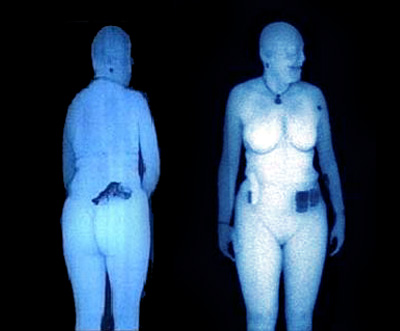
In a post about body scanners last month, I noted that the health effects of these machines has been a “muted part of the debate.” The issue just got less muted. NPR is reporting that a group of scientists at the University of California, San Francisco, has raised concerns over the health effects of backscatter X-ray body scanners, which is one of the two types being deployed (the other being millimeter wave). The scientists’ concerns over backscatter are disputed by the TSA and others, and we at the ACLU do not pretend to be scientists. But, the scientists’ brief letter (PDF), which they sent on April 6 to President Obama’s science advisor John P. Holdren, is worth looking at.
The scientists’ concerns are:
- The majority of the energy directed by these scanners “is delivered to the skin and the underlying tissue. Thus, while the dose would be safe if it were distributed throughout the volume of the entire body, the dose to the skin may be dangerously high.” For that reason it is “misleading,” the scientists say, to compare these scanners’ radiation dose to those of airplane travel or a chest X-ray.
- The fact that “real independent safety data do not exist” — particularly what the scientists describe as the “key data”: the volume of photons delivered per skin area and time.
- A certain proportion of individuals (5 percent, or one in 20 people) are particularly susceptible to genetic damage from X-rays.
- “Because this device can scan a human in a few seconds, the X-ray beam is very intense,” the scientists write, and warn that a hardware glitch with one of these scanners could shower a traveler with “an intense radiation dose to a single spot on the skin.”
Ultimately, the scientists conclude that “there is good reason to believe that these scanners will increase the risk of cancer to children and other vulnerable populations,” and that the “potential health consequences need to be rigorously studied before these scanners are adopted.”
The scientists conclude their letter:
We urge you to empower an impartial panel of experts to reevaluate the potential health issues we have raised before there are irrevocable long-term consequences to the health of our country. These negative effects may on balance far outweigh the potential benefit of increased detection of terrorists.



